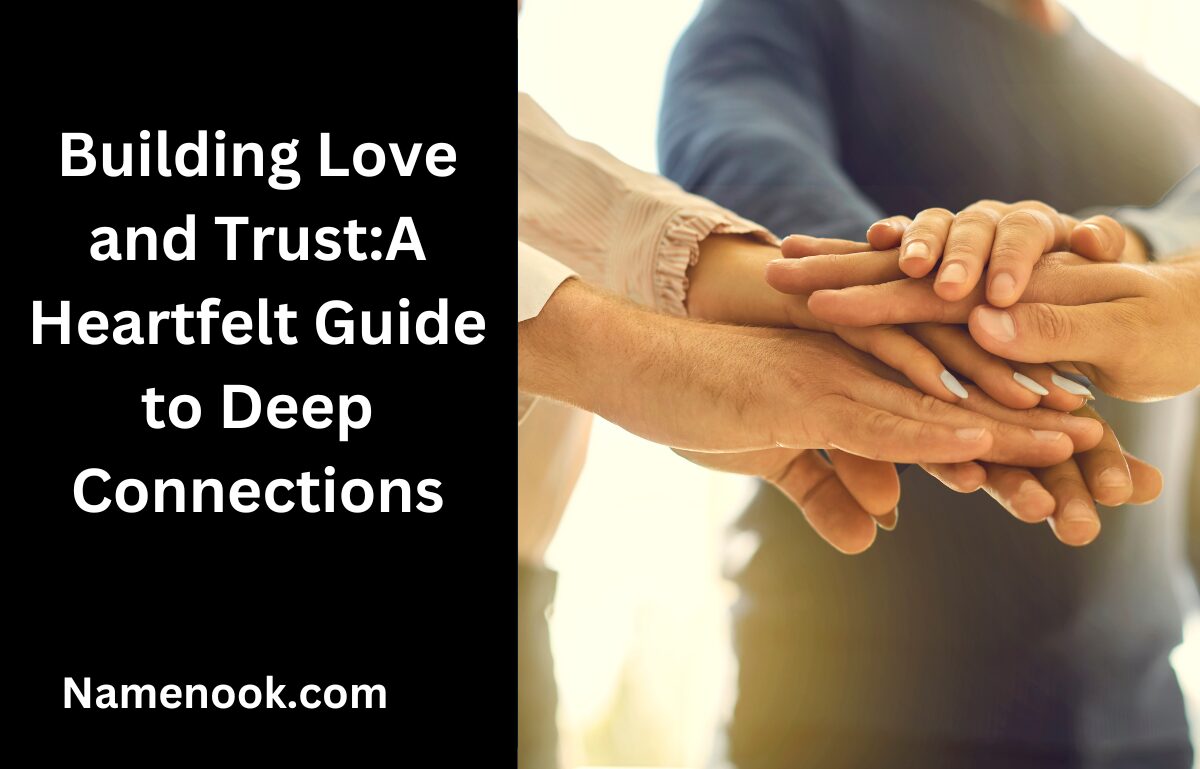Introduction
When you think about love and trust, what comes to mind? For many, they are the cornerstones of any meaningful connection. Whether in friendships, romantic relationships, or even professional settings, love and trust form the foundation for genuine bonds. But how do we truly understand and nurture them? Let’s explore the depths of these emotions and learn how to cultivate lasting connections.
The Core of Love and Trust
At their heart, love and trust are two sides of the same coin. Love is the emotional connection that binds us to others, while trust is the belief in their reliability and integrity. When these elements work together, they create a dynamic duo that fosters stability and intimacy in relationships.
Love without trust often feels hollow, and trust without love can seem mechanical. Together, they weave a safety net that allows relationships to thrive.
Building Blocks of Love
Love is more than a feeling; it’s an action. Here’s how to strengthen it:
Open Communication
Honest and open dialogue creates a safe space for partners to share their thoughts and feelings. Listening without judgment builds understanding and respect.
Acts of Kindness and Thoughtfulness
Small gestures, like a handwritten note or a cup of coffee on a busy morning, go a long way in showing love.
Shared Experiences
Building memories together, whether through travel, hobbies, or simple daily rituals, deepens emotional bonds.
Fostering Trust
Trust doesn’t develop overnight. It’s a process that requires dedication and effort:
Transparency and Honesty
Being upfront about feelings and actions prevents misunderstandings and fosters confidence.
Consistency in Actions
Reliability in small, everyday commitments builds trust over time.
Trust as a Process
It’s not about perfection but about consistently striving to honor promises and resolve conflicts fairly.
Love Without Trust: Can It Work?
Is love enough to sustain a relationship without trust? The answer is complicated. Relationships that lack trust are often fraught with insecurity and misunderstanding. However, with mutual effort and commitment, broken trust can be repaired through open communication and patience.ALSO READ: First Holiday Without a Loved One
Signs of True Love and Trust
How can you tell if a relationship is built on genuine love and trust? There are clear markers that signal a healthy connection.
Emotional Security
When love and trust are present, you feel safe expressing your emotions without fear of judgment. This emotional security fosters open communication and vulnerability, which are key for a deep bond.
Mutual Respect and Support
In a relationship grounded in love and trust, both partners respect each other’s individuality and support one another’s goals. Whether it’s celebrating achievements or providing comfort during tough times, mutual support strengthens the relationship.
Practical Steps to Strengthen Love and Trust
Want to make your relationship stronger? Here are actionable tips to help you build and maintain love and trust:
Active Listening
Listening isn’t just about hearing words; it’s about understanding the feelings behind them. When you truly listen, you validate your partner’s emotions, which builds trust and deepens love.
Expressing Gratitude Daily
Simple expressions of appreciation can go a long way. Saying “thank you” for small gestures makes your partner feel valued and loved.
Setting Healthy Boundaries
Boundaries are essential for maintaining respect in any relationship. Clearly communicating your needs and limits ensures both partners feel understood and safe.
Dealing With Misunderstandings
Conflicts are inevitable, but how you handle them can either strengthen or weaken your relationship.
The Art of Apologizing Sincerely
A heartfelt apology acknowledges mistakes and shows a willingness to improve. Avoid half-hearted apologies like “I’m sorry you feel that way,” which deflects responsibility.
Avoiding Blame Games
Pointing fingers only escalates conflict. Instead, focus on finding solutions and understanding each other’s perspectives to resolve misunderstandings effectively.
Trust in Friendship vs. Romantic Relationships
While trust is crucial in both friendships and romantic relationships, there are subtle differences in how it manifests.
Key Differences and Similarities
In friendships, trust often revolves around loyalty and reliability, such as keeping secrets or being there during tough times. In romantic relationships, trust also involves emotional and physical intimacy.
Maintaining Trust Across Relationship Types
The foundation of trust remains the same—honesty, respect, and consistent actions. Whether it’s a friend or a partner, these principles ensure strong, enduring bonds.
The Role of Vulnerability
To love and trust deeply, you must embrace vulnerability. It’s not easy, but it’s worth it.
Embracing Imperfections
Nobody is perfect, and acknowledging that allows you to connect on a deeper level. Vulnerability shows that you trust your partner to accept you as you are.
Creating Safe Emotional Spaces
Encourage open dialogue and validate each other’s feelings. When both partners feel safe being vulnerable, love and trust naturally flourish.
Impact of Technology on Love and Trust
Technology has revolutionized relationships, but it comes with its challenges.
Navigating Trust in the Digital Age
With constant connectivity, maintaining trust requires clear boundaries. For instance, discussing how to handle social media interactions can prevent unnecessary conflicts.
Social Media’s Influence
While social media can enhance communication, it can also breed insecurity and jealousy. Transparency about online interactions helps mitigate these issues.
Love, Trust, and Self-Growth
Healthy relationships begin with a strong sense of self.
How Self-Love Impacts Relationships
Loving yourself allows you to love others more fully. When you trust your own judgment and value, you’re less likely to rely on external validation.
Trusting Oneself to Trust Others
Learning to trust yourself is the first step toward trusting others. By developing self-confidence, you’ll approach relationships with greater security and openness.
Cultural Perspectives on Love and Trust
Love and trust are universal, but cultural norms shape how they are expressed.
Differences in Love and Trust Across Cultures
For example, in collectivist cultures, trust often revolves around family and community, while individualistic cultures emphasize personal choice and romantic independence.ALSO READ: Long Love Messages for Him
Universal Truths About Connection
Regardless of cultural differences, the need for emotional security, honesty, and respect is universal. These shared values highlight the global importance of love and trust.
Overcoming Fear of Trusting Again
If you’ve been hurt in the past, trusting again can be daunting. But healing is possible.
Steps to Heal From Past Betrayals
- Acknowledge and process your feelings.
- Seek professional support if needed.
- Take small steps toward building trust, starting with yourself.
Rebuilding Confidence in New Relationships
Give yourself time to heal before entering a new relationship. Openly communicate your fears with your partner to foster understanding and patience.
Conclusion
Love and trust are the lifeblood of meaningful relationships. They require effort, patience, and a commitment to mutual growth. By nurturing these qualities daily, you can build lasting connections that bring joy and fulfillment.
FAQs
- Why are love and trust important in relationships?
Love and trust create a foundation of security and intimacy, enabling relationships to thrive. Without them, connections often lack depth and stability. - Can trust be rebuilt after it’s broken?
Yes, but it requires honesty, patience, and consistent effort from both parties. Open communication is key to rebuilding trust. - How does self-love affect relationships?
Self-love boosts confidence and emotional security, allowing you to engage in healthier, more balanced relationships. - What’s the biggest challenge in maintaining trust?
The biggest challenge is consistency. Regularly honoring commitments and being transparent help sustain trust over time. - How can I overcome fear of trusting again?
Start by healing from past experiences, practicing self-compassion, and taking small steps toward building new relationships.

